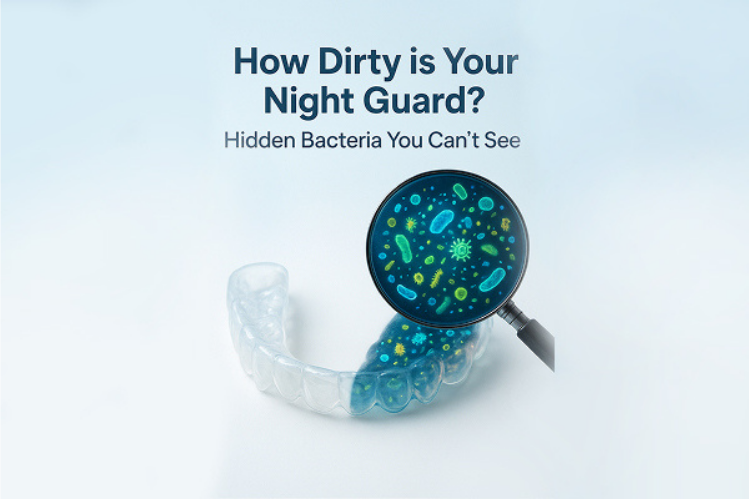
Table of Contents
- What Is a Night Guard and Why Do You Need It?
- Night Guard Allergy Symptoms: When It’s More than Dirt
- Bacterial Infection from Night Guard: What You Should Know
- Dental Night Guard Side Effects You Shouldn’t Ignore
- Silicone Mouth Guard Side Effects: Understanding the Risks
- Best Night Guard for Teeth Grinding: Safety & Hygiene First
- Night Guard Cleaning for Bacteria: Your Complete Guide
- Night Guard Germs Removal: Proven Methods That Work
- Night Guard Oral Bacteria Risks: Beyond the Mouth
- Introducing Smilepath Cleaning Solutions
- Aligner Cleaner + Whitener: Dual-Action Power
- UV Ultrasonic Cleaner: The Ultimate Deep-Clean Solution
- Keep Your Night Guard Clean, Keep Your Smile Safe
- FAQs
If you wear a dental night guard, you already know how helpful it can be in protecting your teeth from grinding or clenching while you sleep. What most people don't know, though, is that night guards can be dirtier than toothbrushes and even bathroom sinks.
Even if their night guard looks spotless, it could be teeming with night guard bacteria, invisible to the naked eye yet potentially harmful to one's oral and overall health. This bacterium may, over time, cause an odor, give rise to infections, and allergic reactions.
So how does this come about, and what do you do about it? Let's dive into the bacterial world that infests your night guard, explore the health risks it might pose, and learn how to maintain a long-term, safe, and clean guard for your oral hygiene.
What Is a Night Guard and Why Do You Need It?
A night guard, also known as an occlusal splint or dental guard, is a protective device worn while sleeping to prevent teeth grinding (bruxism) or jaw clenching. Think of it as a soft barrier that cushions your upper and lower teeth, preventing them from wearing down overnight.
Night Guard Allergy Symptoms: When It’s More than Dirt
Sometimes, discomfort from a night guard isn’t due to bacteria at all; it’s caused by the materials used to make it.
Common Allergy Symptoms Include:
- Swollen lips or gums
- Burning or tingling sensations
- Mouth ulcers or redness
- Sore throat or nasal congestion
- Itchy or peeling skin around the mouth
Bacterial Infection from Night Guard: What You Should Know
Getting a bacterial infection from your night guard isn’t far-fetched; it’s a genuine risk if you skip proper cleaning. Each time you wear an unclean night guard, you’re allowing harmful bacteria to enter your mouth again and possibly spread throughout your body.
Possible Infections Include
- Gingivitis and Periodontitis: Bacteria collect along the gum line, causing inflammation, bleeding, and eventually gum disease if untreated.
- Oral Thrush: Overgrowth of Candida albicans can lead to white patches and soreness in your mouth.
- Respiratory Infections: Breathing in bacteria from your guard might irritate your throat or even infect your airways.
- Digestive Issues: Swallowing bacteria-laden saliva can disrupt your gut microbiome, leading to stomach problems.
- Allergic Reactions: Some people experience night guard allergy symptoms such as redness, itching, or mouth irritation due to bacterial buildup or material sensitivity.
Dental Night Guard Side Effects You Shouldn’t Ignore
Night guards are generally safe, but if you don’t clean them properly, bacteria can build up, and that’s when problems start. Over time, this buildup can cause a variety of uncomfortable side effects.
Common Issues Include:
- Bad Breath (Halitosis): Bacteria on the gum release foul-smelling gases.
- Unpleasant Taste: A metallic or sour taste often means bacterial by-products are lingering.
- Dry Mouth: When bacteria disrupt your mouth’s natural pH balance, saliva production can drop.
- Sore Gums or Tongue: Constant bacterial irritation can inflame soft tissues.
- Acne or Skin Irritation: Germs can transfer from your hands or mouth guard to the skin around your lips and chin.
Silicone Mouth Guard Side Effects: Understanding the Risks
Silicone night guards are popular because they’re soft, flexible, and comfortable, but they’re not perfect. Their porous texture means they can absorb moisture and harbor bacteria much more easily than harder materials.
Potential Side Effects Include
- Moisture and Germ Buildup: Silicone traps saliva, creating the ideal breeding environment for bacteria and fungi.
- Allergic Responses: Silicone components can irritate delicate tissues in sensitive individuals.
- Bad Odor: When bacteria flourish, they often produce an unpleasant smell.
- Discoloration: Yellowing or dark spots often signal microbial buildup or material breakdown.
Best Night Guard for Teeth Grinding: Safety & Hygiene First
Choosing the best night guard for teeth grinding isn’t just about comfort; it’s about finding the perfect balance between protection, hygiene, and durability.
Here’s what to keep in mind when shopping for one:
Custom-Fitted Guards (Dentist-Approved)
These are professionally made using molds of your teeth, so they fit perfectly. They’re usually less porous, easier to clean, and much better at resisting bacterial buildup than store-bought options.
Boil-and-Bite Guards
If you’re on a budget, these are a decent alternative. You soften them in hot water, bite down to create a custom fit, and wear them overnight. However, they tend to wear out faster, which can make them more prone to trapping bacteria over time.
Material Type
Always choose medical-grade, BPA-free, and hypoallergenic materials. They’re safer for long-term use and reduce your chances of developing allergic reactions or sensitivity.
Cleaning Compatibility
Ensure your night guard can handle antibacterial cleaners or UV sanitizers without getting warped, discolored, or damaged.
Night Guard Cleaning for Bacteria: Your Complete Guide
Simply rinsing your night guard under water and tossing it into its case isn’t enough. To keep your guard hygienic , you need a proper routine.
Daily Cleaning Routine
- Rinse immediately after taking it out in the morning to remove saliva and loose debris.
- Brush gently with a soft toothbrush (skip toothpaste, it’s too abrasive).
- Use mild soap or an antibacterial cleaner to kill bacteria effectively.
- Air dry completely before storing it in its case. Moisture invites bacterial growth, so never skip this step.
Weekly Deep Cleaning
Once a week, give your night guard a more thorough cleanse using one of these methods:
- Antibacterial Tablets: Dissolve one in warm water and soak your guard for 10–15 minutes.
- Ultrasonic Cleaners: These devices vibrate gently to dislodge microscopic particles.
- UV Sanitizers: They eliminate up to 99.9% of bacteria without chemicals.
Night Guard Germs Removal: Proven Methods That Work
If you’ve been a bit lax with your cleaning routine, don’t panic; you can still bring your night guard back to a hygienic state.
Here are a few effective ways to remove built-up germs:
- Hydrogen Peroxide Soak: Mix equal parts of hydrogen peroxide and water, soak for 5–10 minutes, then rinse thoroughly.
- Vinegar and Baking Soda: This natural combo neutralizes odors and kills bacteria effectively.
- Effervescent Tablets: These dental cleaning tablets lift away plaque, debris, and biofilm.
- Professional Cleaning: Some dentists offer ultrasonic or steam cleaning for mouth guards and retainers.
Night Guard Oral Bacteria Risks: Beyond the Mouth
Your oral health affects far more than just your smile; it’s directly connected to your overall well-being. When your night guard isn’t properly cleaned, bacteria don’t just stay in your mouth. They can travel through your body and cause more serious health problems.
Potential Systemic Risks Include
- Heart Disease: Harmful oral bacteria can enter the bloodstream and contribute to inflammation and plaque buildup in the arteries.
- Respiratory Issues: Breathing in bacteria while you sleep can irritate your throat and lungs, leading to sinus infections or even bronchitis.
- Digestive Disorders: Swallowing bacteria from your guard can disrupt your gut balance, causing stomach upset or infections.
- Weakened Immunity: Chronic exposure to bacteria can wear down your immune system over time, making you more vulnerable to illness.
Introducing Smilepath Cleaning Solutions
When it comes to keeping your dental appliances truly clean, everyday rinsing simply doesn’t cut it. To ensure your aligners, retainers, and night guards stay spotless, odor-free, and long-lasting, it’s worth investing in a professional-grade cleaning system.
Smilepath offers two powerful solutions designed specifically for dental appliances: the Smilepath Aligner Cleaner + Whitener and the Smilepath UV Ultrasonic Cleaner . Together, they don’t just eliminate night guard bacteria; they also help maintain freshness, clarity, and longevity.
Aligner Cleaner + Whitener: Dual-Action Power

If you’ve been relying on simple water or toothpaste to clean your night guard, you’re barely scratching the surface. Smilepath Aligner Cleaner + Whitener goes further, combining antibacterial power with gentle whitening action to keep your appliance looking and feeling like new.
Key Benefits
- Powerful Bacteria Removal: Scientifically formulated to eliminate 99.9% of germs, including those invisible night guard bacteria that water alone can’t clean.
- Whitens and Restores Clarity: Over time, guards and aligners can become cloudy or discolored from saliva, plaque, or drinks.
- Safe for Daily Use: Non-abrasive and free from harsh chemicals that could damage your silicone, acrylic, or plastic device.
How to Use?
- Mix the recommended amount of cleaner with warm (not hot) water.
- Soak your guard or aligner for 10–15 minutes.
- Rinse thoroughly and allow it to air dry completely.
UV Ultrasonic Cleaner: The Ultimate Deep-Clean Solution

For those who want professional-grade hygiene from the comfort of home, the Smilepath UV Ultrasonic Cleaner takes cleanliness to a whole new level. This advanced device combines ultrasonic vibration technology with UV-C sterilization, ensuring every microscopic corner of your night guard is thoroughly disinfected.
Key Benefits
- Deep 360° Cleaning: Cleans every curve and crevice of your guard, removing biofilm and buildup that cause odor and discoloration.
- Chemical-Free Disinfection: Uses light and vibration instead of harsh chemicals; perfect for users with sensitive gums or allergies.
How to Use?
- Place your pre-rinsed night guard into the device.
- Add water or Smilepath cleaning solution (optional for extra freshness).
- Activate both the ultrasonic and UV-C cleaning modes.
- Wait for the cycle to finish, usually 5–10 minutes.
Keep Your Night Guard Clean, Keep Your Smile Safe
A clean night guard means a healthier mouth and body. Poor hygiene can lead to bacterial infections, allergies, and unpleasant odors. Regular cleaning protects you from these hidden risks. With Smilepath’s Aligner Cleaner + Whitener and UV Ultrasonic Cleaner, you can easily eliminate night guard bacteria and restore freshness . These advanced solutions remove 99.9% of germs while keeping your device crystal clear and safe. Stay consistent, stay protected, and let Smilepath simplify your nightly hygiene, because a clean night guard is the key to a confident, healthy smile every morning.
FAQs
Yes. A dirty mouth guard can harbor harmful bacteria that may cause gum infections, bad breath, or even oral thrush if not cleaned properly.
Use an antibacterial cleaning solution or Smilepath Aligner Cleaner + Whitener, and rinse thoroughly. For deep cleaning, use the Smilepath UV Ultrasonic Cleaner a few times a week.
Bacteria and plaque can build up, leading to infections, unpleasant odors, discoloration, and even material damage over time.
Replace it every 6–12 months or sooner if it becomes discolored, cracked, warped, or develops a persistent odor.
Yes. The moist, enclosed environment of a night guard easily traps bacteria and saliva, making daily cleaning essential.
Soak it in a disinfecting solution or use ultrasonic and UV-C technology like the Smilepath UV Ultrasonic Cleaner for complete germ removal.
Citations:
Glass, R. T., Bullard, J. W., Conrad, R. S., Blewett, E. L., & Gulden, J. W. (2001). Microbiota found in dental "mouthguards." Sports Dentistry, 15(4), 191–196. https://doi.org/10.1016/S0002-8177(01)00097-7
Low, B., Parthasarathy, S., & Ganguly, R. (2019). Microbial contamination of removable dental appliances and its implications: A systematic review. Journal of Oral Microbiology, 11(1), 1596524. https://doi.org/10.1080/20002297.2019.1596524







 Australia
Australia New Zealand
New Zealand Malaysia
Malaysia English
English Portuguese
Portuguese English
English English
English English
English English
English English
English Canada
Canada